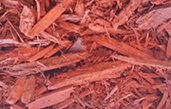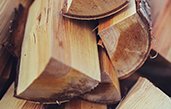
Organic mulch offers a number of benefits to home gardeners, including increased moisture retention, easy maintenance, effective weed control, and erosion mitigation. These practical benefits of organic mulch aren’t the only reasons it’s so popular among landscapers and home gardeners, though. Organic mulch also confers aesthetic benefits. Read on to find out how to take advantage of them in any garden or landscape.
How to Choose the Right Mulch
The first thing to consider when adding mulch to a garden or landscape is what kind of trees were used to produce it. Premium hardwood mulch is usually sourced from oak trees. Regular hardwood mulch can be made from the bark or wood of any type of hardwood tree.
Organic mulch is formulated only from natural wood. It doesn’t contain dyes or colorants like most decorative mulches, which makes it perfect for everything from flower beds to food gardens. Choosing a supplier that uses only organic products not treated with chemical additives is a great way to ensure that gardeners won’t be introducing toxins into their soil. Anyone who wants to mulch vegetable beds should seriously consider sticking with organic materials.
Colored Mulches
Not all colored mulches are dyed with chemicals. Organic suppliers use natural ingredients to color their mulch, which means buyers can use it wherever they want without worrying about how it will affect their soil, plants, and health. Here are a few innovative ideas for using natural colored mulch to beautify a landscape:
- Choose a brown or red mulch to complement brick houses.
- Use a black or dark brown mulch to create contrast in flower beds.
- Try a mixture of colors to add visual interest.
- Cover all bare soil to control erosion.
- Protect the bases of trees with blonde mulch to create color contrast with trunks.
- Apply organic mulches directly to soil.
Hardwood vs. Softwood Mulches
Softwood mulches may be just as beautiful as hardwood mulches, but they can alter the pH of the soil. Pine trees, for example, can make the soil more acidic. This impacts the plants grown in flower beds, vegetable gardens, and lawns, so it’s best to stick to hardwood mulches in any areas where plants are grown.
It’s also relevant to note that hardwood mulches usually break down faster than softwood mulches. That’s because most of the fungi that help break down wood thrive in hardwoods. This may sound like a disadvantage, but gardeners know that fungal networks improve soil health and broken down mulch adds organic matter to the soil, especially if it’s full of beneficial fungi. Want to improve the mulch’s appearance without destroying its beneficial fungi? Just rinse the top layer of mulch off using a garden hose.
The Bottom Line
Organic hardwood mulches are much better for the environment than chemically treated or dyed alternatives. They’re also better for garden beds than softwood mulches, since they don’t dramatically alter soil pH. Incorporating mulch into the landscape will be great for both the local ecosystem and the home’s residents since it will beautify the property while simultaneously increasing soil fertility.
Place an online order today, and ask about our spreading and yard cleanup services!



